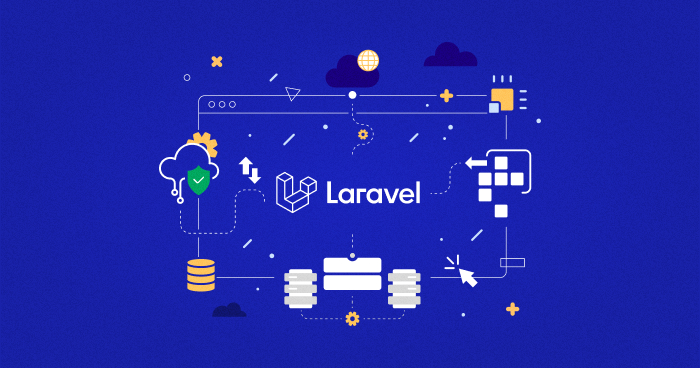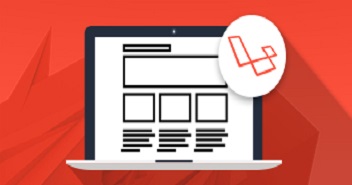
Software as a Service (SaaS) development is not easy, considering multiple factors, like the architecture development to the features included in the product.
Many developers tackle these challenges by choosing a framework that makes things simpler for them to execute. The seemingly minor decision to select a framework sets the project’s scope and dramatically influences the SaaS products’ features and capabilities.
Over the years, Laravel has become the first choice for developers to build high-performance SaaS projects aimed at heavy traffic and high-end features. This is because Laravel offers pre-built tools to manage the SaaS subscription process smoothly.
This blog covers everything you need to know about Laravel and why it is the most-favored PHP framework to build SaaS applications.
Let’s learn the basics of SaaS and Laravel before we delve into a detailed understanding of why Laravel is perfect for SaaS.
- What is Software as a Service (SaaS)
- Why Should Developers Go for SaaS Development?
- What is Laravel
- Why Is Laravel the Right Fit for SaaS?
- Examples of SaaS Built on Laravel
- Technologies to Create SaaS with Laravel
- Single Window view for Laravel SaaS
- Laravel and SaaS Revenues
- Hosting Solution For Laravel Powered SaaS Products
- Introducing Cloudways
- Final Words
What is Software as a Service (SaaS)
SaaS is a software distribution model in which users interact and use the software directly over the internet (whether via a native app or a browser). In most cases, SaaS projects don’t require you to download anything and provide everything online.
SaaS offers many benefits, including file sharing, email, human resources, calendars, and CRM. Most of the SaaS products generate recurring revenues for the brand. Also, these multi-user applications offer numerous features and have cloud-based support.
Speaking of the cloud, its technology is taking the world by storm. And cloud computing technology typically caters to providing technical services through the internet, including networking, servers, and data storage.
Improve Your PHP App Speed by 300%
Cloudways offers you dedicated servers with SSD storage, custom performance, an optimized stack, and more for 300% faster load times.
Why Should Developers Go for SaaS Development?
Developers prefer the SaaS model, as it simplifies product deployment and development. And for the end-users, it simplifies costs and offers budget-friendly plans for users of all kinds. So, it’s a win-win situation.
With the SaaS model, a user just has to pay for the resources he uses or a fixed volume of services consumed, although in some cases, they are required to pay an initial down payment. After that, the additional usage of services/products is available at nominal costs.
Also, SaaS streamlines a product’s deployment thanks to its distributed nature. After a product’s development, it is deployed following the standard process. If there’s an update or a new feature, the new (or revised) component must only be deployed on the original server. So, the users only have to re-login to their accounts to use the new features.
What is Laravel
Laravel is a Model-View-Controller (MVC) framework built for web artisans and provides a scalable structure to write easy-to-understand code. It offers a system where developers don’t build a product from scratch, thanks to the pre-built functions and components that reduce development time.
With other frameworks, developers have to work on navigation, routing, authentication, security, password hastings, sessions, and caching. Laravel removes the pain of reinventing the wheel because it lets you build the features with just a few lines of code.
Moreover, Laravel is free, open-source, and easily accessible for building awesome web apps. It also provides peace of mind and features that handle database migrations, permissions, unit tests, and Ecommerce modules.
Why Is Laravel the Right Fit for SaaS?
Software-as-a-Service (SaaS) applications are multi-user apps that deliver a wide range of features. A use case of SaaS products is using existing products to create better applications, leveraging SaaS products’ features to add value to online businesses.
Building a SaaS application, especially with Laravel SaaS, can be a bit challenging for non-tech-savvy users. But with Laravel’s components for building modules such as subscriptions, payments, and admin dashboards, users can easily build their apps, and finding reliable SaaS hosting ensures seamless operation.
Laravel simplifies the delivery of SaaS product functionalities like free trials, full users, and deal-based offers. Additionally, Laravel is ideal for building products, serving many users due to its robustness and extensibility.
Laravel Supports Modular App Structure
Being an MVC framework, Laravel allows developers to build modules (each with single or multiple features) for plugging into the main application.
Consider the example of an ecommerce store where you need to host a giveaway. For this, you can create a contest module that can be easily plugged into the main ecommerce application. Once the giveaway is over, the module can be disabled or plugged out.
Laravel is (very) Customizable
Laravel simplifies application architecture and is ideal for large dev teams. Using a version control system such as Git, the development team can work on customizing the product features without worrying about code maintenance issues.
The MVC model allows Laravel-based applications to have separate models, controllers, and views. Developers can work with these components individually without stressing over disturbing the application design and component connections.
Also, Laravel comes pre-optimized with features like an internal caching system, routes caching, autoload optimization, JIT compiler, minification, eager loading, and CDN. Developers can optimize all these components with custom code to add value to the SaaS product.
Third-party Tool Integration
When building Laravel SaaS apps, developers often want to connect third-party APIs (popular choices being payment gateways, image processing APIs, and analytics) to produce data views for the users. Laravel has a simple API management process; another reason developers opt for Laravel for removing development complexities related to API connection and management.
Supports MVC Structure
Developers working with the Laravel system can easily create specific software modules due to the MVC app architecture or structure. Such modules can have different features or focus on just one feature, which can be connected seamlessly with the initial or primary application.
Let’s consider that you have an ecommerce store and want to launch a markdown offer. To do this, you’ll create one discount module and adjust it with your online store anytime. The module remains synced until the discount offer is open. Once you end the offer, you must disable the module or plugin.
Code Maintenance
Every developer has to deal with code maintenance, which can become highly daunting for both the development and the testing teams. However, using Laravel ends many such problems as it allows the developers to customize the SaaS app without messing around with the backend coding.
Laravel’s MVC framework allows both teams to work with every component individually without thinking much about the connection and distribution aspects.
Examples of SaaS Built on Laravel
Now that I have mentioned some reasons that make Laravel a great option for developing SaaS products, I would like to follow up with some real-world examples of Laravel-powered SaaS products.
Laravel Spark
Laravel Spark provides the proper framework for SaaS product features, like billing, subscription, team management, and invoicing. It also takes care of the applications’ security features, such as authentication, password resets, profile pictures, and 2FA.
Cloudways
Cloudways is another great example of Laravel in action. The managed Laravel hosting platform simplifies cloud hosting for all users and ensures the lightning-fast performance of all PHP-powered applications.
Cloudways allows users to use several SaaS features such as invoicing, billing, and payments while managing their apps.
Laravel Envoyer
Envoyer helps developers leverage all the benefits of continuous deployment for their projects. Envoyer is a perfect example of a Laravel SaaS application, as it lets you connect the hosting servers to GitHub and then move files after commits.
Technologies to Create SaaS with Laravel
A SaaS product generally comprises three architectural components – the web stack, the front, and the backend.
The business logic and the feature set are deployed on these three components. All this is generally invisible to the end-users who see a dashboard and/or feature set they can use for their business processes.
There are simply too many frontends and backend frameworks to recommend for building SaaS products. Add the number of libraries and packages that provide specialized services, making it even more difficult for developers to choose the right option. What separates Laravel from other frameworks is the native support of all industry-leading frameworks and packages.
Scalable applications often face optimization and performance issues. If the number of concurrent users increases exponentially, the application may break down, and/or the users will experience a severe lag in application performance. In this context, SaaS product developers should explore Docker, Kubernetes, and Cluster-based solutions to deal with performance and uptime issues.
Single Window view for Laravel SaaS
To understand why Laravel and SaaS products are such a great mix, let’s consider a simple yet vital aspect shared by many SaaS products: Dashboards.
Dashboards lie at the heart of the SaaS product design. Information from all touchpoints in the application architecture is displayed to the users through a dashboard. In many cases, it shows the user all the settings and options he needs to use the SaaS product.
Dan Schoenbaum has written a great piece on SaaS analytical dashboards if you are interested in exploring the idea of dashboards for SaaS products.
Laravel and SaaS Revenues
Revenues are an important aspect of all SaaS product operations. According to a recent piece published in ZDNet, SaaS products are projected to earn in the neighborhood of $85 in 2019. If you are interested in a detailed breakdown of the SaaS revenue predictions, give this article a read!
Laravel can Support All SaaS Revenue Models
SaaS is great at supporting and offering a wide range of revenue models. From simple flat pricing to per-user (and overall usage) resource consumption pricing models, SaaS-based products support all revenue generation and collection ideas.
However, SaaS is all about recurring revenue generation. While some products prefer one-shot flat pricing, most SaaS products prefer a subscription-based revenue model that ensures sustained income. The SaaS model also uses user feedback to improve the product and move new ideas to the top of the execution pile.
Laravel Simplifies SaaS Revenue Processing
Laravel is the ideal framework for SaaS products, mainly because of the ease of adding payment collection and processing components to the platform. That said, it also lets you code your payment collection module, but why would you dedicate efforts to something already available in Laravel?
Laravel Cashier is a package that provides a powerful yet simple option to set up subscription-based revenue collection product components. It is based on Stripe and is a great option for collecting recurring subscription-based revenues, coupons, and general subscription management options.
Laravel Cashier is an end-to-end recurring revenue collection and process management component with digital invoicing and general user management capabilities. SaaS products use it to create customized payment collection components that handle single-shot and recurring revenue models.
Hosting Solution For Laravel Powered SaaS Products
The solution that hosts SaaS products determines the product’s long-term success. While selling the product in the first round is easy, its performance ensures sustained revenues and an increasing market share.
Considering that, you must be careful while selecting the hosting solution to power your SaaS products. And cloud hosting emerges as the best option, considering the cost-to-benefits ratios, pricing, and various other features. If you go with other hosting solutions like shared hosting (limited features) or dedicated hosting (expensive), they’d lack in one way or another.
The Server Management Challenge
Server management is crucial in SaaS products’ development and maintenance activity. Many developers despise the server management job as it distracts them from their primary goal, i.e., to develop excellent SaaS products.
Once the developers have created a product and tested it in a sandbox, they deploy it on a live server and make it available for the users. And this process requires developers to match versions and eliminate package dependencies to ensure smooth operations.
Infrastructure issues continue to arise even after the product has gone live, requiring the developers’ constant attention and stealing their focus away from product and feature improvements.
Managed Hosting to the Rescue
Managed hosting solutions are built on top of the industry-leading IaaS providers to ensure optimal performance and are a lifesaver for SaaS product development teams.
These hosts add a custom layer to the provisioned cloud servers that handle the bulk of server management tasks. Also, managed hosting providers offer a varying feature set comprising server provisioning, server management, stack upgrades, and, most importantly, server security.
Keep Your Apps Secure on Cloud
Cloudways offers 2FA, free SSL, and more advanced security features on managed servers that keep your application safe.
When SaaS developers opt for a managed cloud hosting solution, they only need to focus on their application layer and component integration, without worrying about server-level maintenance tasks.
Developing Laravel SaaS Project With Cloudways
Now that we know how managed cloud providers help Laravel SaaS projects, choosing a provider that offers the right technologies for SaaS-based applications is crucial. And Cloudways is a favorite among SaaS developers as its Laravel stack is pre-built with technologies like Nginx, Apache, Memcached, Redis, PHP7, and MySQL to provide the best environment to run large-scale applications.
Launching Laravel applications on Cloudways is easy, thanks to its quick 1-click solutions. You can launch Laravel with a complete web stack in a few clicks and manage everything directly from the platform. And it lets you choose from top IaaS providers like DigitalOcean, Google Compute Engine, AWS, Linode, and Vultr.
Also, you can set up all features like cloning, staging, CDN, SSL, and remote connections instantly. All these options provide you the flexibility to develop Laravel SaaS projects with absolute ease on Cloudways.
Final Words
SaaS projects can be challenging, so developers must opt for the best frameworks and hosting providers to deliver optimum results.
Developers consider Laravel among the best frameworks for SaaS because of its stability and how it simplifies workflows. Also, Laravel allows developers to create amazing features by leveraging the vast package library created and maintained by Laravel developers worldwide.
And to deliver the Laravel SaaS product features without any issues, developers trust managed cloud hosting solutions like Cloudways during all stages of product development, delivery, and maintenance. As managed hosts like Cloudways take away the burden of server management, developers can solely focus on their development processes.
Q. Is Laravel good for SaaS ?
A: Laravel is the right choice for SaaS projects because it is pre-equipped with all the components for building modules like subscriptions, payments, and admin dashboards. This framework streamlines operations for the Laravel SaaS items, such as deal-based offers and trials.
Q. Is Laravel good for big projects ?
A: Laravel is considered an ideal choice for big projects due to the following reasons:
- Maintainability: Laravel lets you write & update easy-to-maintain code. It follows a logical structure, making it easier for developers to understand and work with the code.
- Scalability: You can handle big projects with Laravel, as it can be easily scaled to meet your developing business needs.
- Flexibility: Laravel is flexible and can be customized to meet your business’ specific needs, making it an incredible choice for businesses that require custom web applications.
In short, It is a powerful, business-friendly framework that helps rapidly build large scale applications.
Shahzeb Ahmed
Shahzeb is a Digital Marketer with a Software Engineering background, works as a Community Manager — PHP Community at Cloudways. He is growth ambitious and aims to learn & share information about PHP & Laravel Development through practice and experimentation. He loves to travel and explore new ideas whenever he finds time. Get in touch with him at [email protected]


